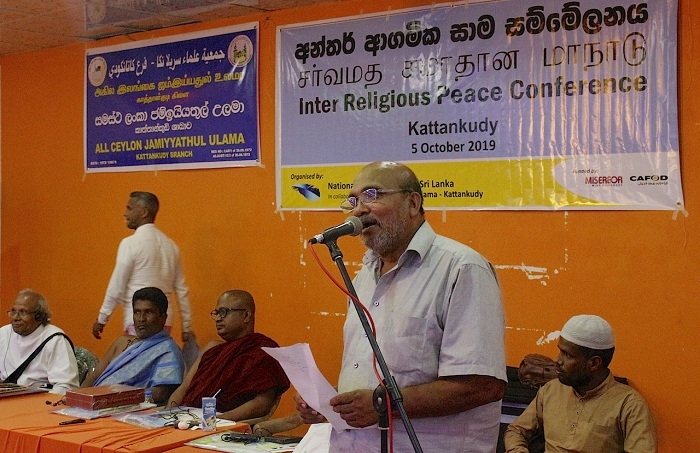Religious leaders and representatives of Community Based Organizations (CBOs) belonging to District Inter Religious Committees (DIRCs) from 16 districts participated in a four-day exchange visit to Batticaloa and Kattankudy.
A variety of activities and discussions with farming and fishing communities, religious leaders, media personnel and war victims allowed participants to experience the Eastern province and the lives of its people.
The first stop of the visit was Polonnaruwa where the group met members of Polonnaruwa DIRC and exchanged views about the situation after the April Easter Sunday attacks and discussed how DIRCs had helped to ease tense situations with the help of the government officials and the police.
In Vakarai participants met a farming community in a rural village who had suffered during the war and were still looking for missing relatives and listened to their difficulties. An urgent issue they raised was the spread of drugs in the village and how it was adversely affecting the youth. DIRC members promised to bring these problems to the attention of relevant authorities to find solutions.
In Batticaloa, the group visited a Buddhist temple, which had a kovil on its premises. The chief monk said that the kovil was built on temple land to foster unity and harmony among Buddhist and Hindu people who lived in the area. This proved to be a success as devotees of both religions visited both the temple and the kovil.
During a visit to a fishing community, the group discussed problems faced by villagers who had minimal resources. DIRC members gave them advice on the best ways to solve their difficulties and suggested that they joined Batticaloa DIRC.
On the final day, 122 religious leaders and CBO leaders attended an Inter Religious Peace Conference organized by NPC with the collaboration of the Jamiyyathul Uluma branch of Kattankudy.
The religious leaders spoke about the values in their respective religions that promoted peace and harmony while exchanging experiences about different DIRC best practices from each district.
The participants said they were pleased to attend such a conference that promoted peace and harmony among all citizens of Sri Lanka.
During a visit to a fisheries community, the group discussed problems faced by villagers who had minimal resources. DIRC members gave them advice on the best ways to solve their difficulties and suggested that they joined Batticaloa DIRC.
On the final day, 122 religious leaders and CBO leaders attended an Inter Religious Peace Conference organized by NPC with the collaboration of the Jamiyyathul Uluma branch of Kattankudy.
The religious leaders spoke about the values in their respective religions that promoted peace and harmony while exchanging experiences about different DIRC best practices from each district. The participants said that they were pleased to attend a conference that promoted peace and harmony among all citizens of Sri Lanka.
The inter religious conference in Kattankudy that followed the exchange visit involved members of District Inter Religious Committees (DIRCs) set up in 22 districts in the country as civil society formations with organic links to the larger community. The main area of the exchange was the volatile Eastern Province in which each of the three main communities is almost equally represented with consequent rivalries and tensions.
The choice of Kattankudy for the conference was especially significant as it was the hometown of the leader of the now-banned National Thowheed Jamaat, Zahran Hashim, who led the suicide bombers on Easter Sunday that claimed the lives of over 250 persons and targeted Christian churches and luxury hotels.
As the conference was to share experiences, it was scheduled from 6 to 9 pm at the conclusion of the exchange visit, where the members of DIRCs from the other districts met with fishing communities, women headed households and families of missing persons, among others. However, there were two factors that delayed the conference that the organizers from Colombo had not foreseen. The first was the need of the participants from Kattankudy to take a prayer break shortly after the conference began, in which they went to a nearby mosque. Getting the more than hundred participants back into their seats after the prayer break took up some time.
Second, a further delay arose over the issue of musical accompaniment to the peace songs of Jayatilaka Bandara of Saadu Janaravaya. There were some from Kattankudy who were apprehensive that the controversy over whether music should accompany the songs would derail the harmony of the inter religious conference. However, the intervention of Abdullah Alim, a moulavi from Puttalam, was useful in resolving the problem. He said that Saadu Janaravaya was not the music of a rock band, but more akin to the sweetness of a rose that is accompanied by thorns. The songs and music of Jayatilaka Bandara thereafter provided a welcome interlude to the many speeches that followed.

